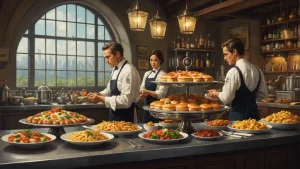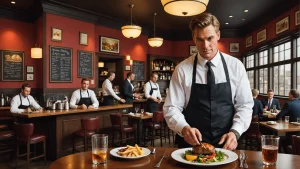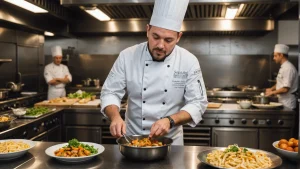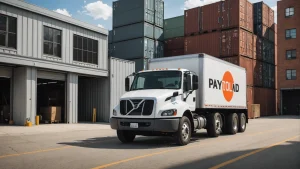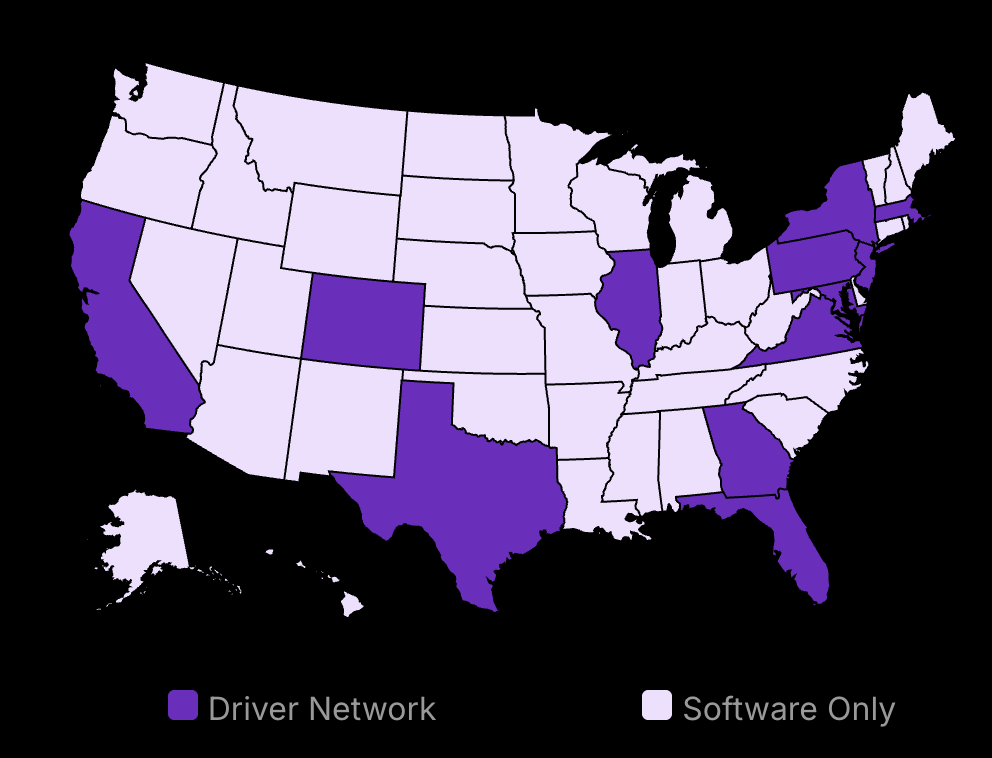Hiring a skilled kitchen manager is one of the most important decisions you can make for your restaurant’s success.
Kitchen managers are the backbone of a thriving culinary operation. They juggle everything from staff training and inventory control to ensuring every dish meets your high standards. What does it encompass to helm the kitchen as a manager? Explore the multifaceted responsibilities, hurdles, and satisfactions entailed in the vital role of a kitchen manager within the bustling realm of culinary arts.
In this comprehensive guide, we’ll break down:
The key roles and responsibilities of a kitchen manager
Essential skills to look for when hiring
How a great kitchen manager can boost your bottom line
By the end, you’ll have a crystal-clear understanding of what a top-performing kitchen manager brings to the table – and how to find the right fit for your business.

Metrobi drivers are rated 4.97 out of 5
Trusted by local businesses for:
- Background-checked professionals
- Specialized in business deliveries
- Same drivers for consistency
- 4.97/5 average delivery rating
What is a Kitchen Manager? Kitchen Manager Job Description
A kitchen manager is responsible for overseeing all aspects of a restaurant’s kitchen operations Lastly, integrating streamlined logistics like a reliable delivery system is pivotal for operational efficiency in restaurants. Utilizing services such as a specialized same-day courier service in Dallas can enhance your kitchen efficiency by ensuring timely ingredient deliveries and minimizing disruptions.
Their primary objective is to ensure smooth functioning, quality food preparation, and adherence to health and safety standards
Kitchen managers optimize kitchen processes for maximum efficiency and profitability
Kitchen managers play a vital role in the success of any restaurant or food service establishment. They are the backbone of the kitchen, ensuring that everything runs smoothly and efficiently. One way to enhance your restaurant’s operational success is by utilizing convenient services like same-day delivery. Incorporating an efficient delivery system can help cater to a wider customer base, allowing diners to enjoy your culinary creations from the comfort of their homes. Explore our innovative solutions for Austin same-day delivery options that could elevate your restaurant’s service offerings.
Examples of Kitchen Manager Roles
Kitchen managers can be found in various settings, from fine-dining restaurants to fast-food chains and catering companies. Here are a few examples:
Head Chef in a fine dining restaurant
In a fine dining establishment, the head chef is often the kitchen manager. They are responsible for creating and executing high-quality dishes, managing the kitchen staff, and ensuring that the restaurant’s reputation for excellence is maintained. Discover the pivotal functions of an assistant chef, who plays a crucial role in supporting the head chef to uphold the kitchen’s high standards.
Kitchen Supervisor in a fast-food chain
In a fast-food chain, the kitchen supervisor is responsible for overseeing the preparation of food, ensuring that orders are fulfilled quickly and accurately, and maintaining food safety standards.
Culinary Manager in a catering company
In a catering company, the culinary manager is responsible for planning menus, ordering ingredients, and overseeing the preparation of food for events. They must be able to manage large-scale food production and ensure that the quality of the food meets the client’s expectations.
Types of Kitchen Managers
There are several types of kitchen managers, each with their own specific roles administrative tasks, and responsibilities. The two most common types are Executive Chefs and Sous Chefs.
Executive Chef
The Executive Chef is the highest-ranking kitchen manager in a restaurant or food service establishment. They are responsible for overseeing multiple kitchens or restaurants, developing menus and recipes, and managing budgets and pricing.
Sous Chef
The Sous Chef is the second-in-command of kitchen employees to the Executive Chef. They are responsible for managing day-to-day kitchen operations, training and supervising kitchen staff, and filling in for the Executive Chef when necessary. A survey by the Bureau of Labor Statistics found that “Sous Chefs typically have 5-10 years of experience in the culinary industry and a degree or diploma in culinary arts.”
The kitchen manager job description and objective of a kitchen manager is to ensure that the kitchen operates efficiently, produces high-quality food, and maintains a safe and sanitary environment. They are responsible for managing the kitchen staff, controlling costs, and ensuring customer satisfaction. Explore the duties of a kitchen manager, focusing on their pivotal role in overseeing kitchen operations and coordinating the efforts of the culinary team, including prep cooks.

Metrobi is transforming catering deliveries
Specialized solutions for catering businesses:
- Catering-trained drivers
- Proper handling equipment
- Peak day delivery support
- 23% average cost reduction
Kitchen Manager Job Responsibilities and Duties
Managing Kitchen Staff
A kitchen manager’s primary responsibility is to effectively manage the kitchen staff. This involves hiring, training, and supervising employees to ensure they have the necessary skills and knowledge to perform their job duties efficiently. The kitchen manager creates staff schedules, taking into account the restaurant’s busiest times and the strengths of each team member. They assign tasks based on an employee’s expertise and experience, ensuring that everyone is working towards a common goal. Uncover the vital roles and tasks of a kitchen manager crucial for every restaurateur to comprehend, aiming to streamline kitchen operations and elevate culinary success.
In addition to overseeing daily operations, the top kitchen manager’s job is also responsible for resolving conflicts among staff members and maintaining a positive work environment. They must possess excellent communication and leadership skills to effectively motivate and guide their team. By fostering a culture of respect, collaboration, and open communication, kitchen managers can create a cohesive and productive kitchen staff.
Maintaining Food Quality and Safety
Another critical aspect of a kitchen manager’s job is ensuring that all dishes are prepared to the restaurant’s standards. They develop and implement quality control measures to maintain consistency in taste, presentation, and portion sizes. This involves regularly tasting dishes, providing feedback to chefs, and making necessary adjustments to recipes or cooking techniques.
Food safety and hygiene are also top priorities for kitchen managers. They are responsible for implementing and enforcing strict food safety protocols, such as proper food storage, handling, and preparation techniques. This includes ensuring that all kitchen staff are trained in food safety best practices and adhere to local health department regulations. Kitchen managers conduct regular inspections to maintain cleanliness, sanitation, and safety standards and organization, minimizing the risk of foodborne illnesses and creating a safe working environment.
Inventory Management and Ordering
Effective kitchen inventory and management is crucial for controlling food costs and minimizing waste. Kitchen managers are responsible for monitoring inventory levels and placing orders for ingredients and supplies promptly. They must strike a balance between having enough stock to meet customer demand and avoiding overstocking, which can lead to spoilage and financial losses. Discover valuable restaurant staff training ideas on managing kitchen inventory efficiently, ensuring your team is skilled in minimizing waste and controlling costs.
Kitchen managers often negotiate with suppliers to secure the best prices and quality for their ingredients. They may also explore opportunities to source local or seasonal produce to enhance the freshness and flavor of their dishes while supporting the local economy. By carefully tracking inventory and sales data, kitchen managers can identify trends and make data-driven decisions to optimize their ordering process and reduce waste.
Developing and Costing Menus
Kitchen managers play a key role in developing and costing menus that are both appealing to customers and profitable for the restaurant. They collaborate with chefs and owners to create dishes that showcase the restaurant’s unique style and utilize seasonal ingredients. When designing menus, kitchen managers must consider factors such as ingredient availability, food costs, labor costs, and customer preferences.
To ensure profitability, kitchen managers carefully calculate the cost of each dish, taking into account the price of ingredients, portion sizes, and preparation time. They keep monthly cost reports and use this information to set menu prices that cover costs and generate a reasonable profit margin. Kitchen managers also regularly review and update menus based on sales data, customer feedback, and changing market trends.
Collaborating with Front-of-House Staff
While kitchen managers primarily focus on back-of-house operations, they also work closely with front-of-house staff to ensure a seamless dining experience for customers. This collaboration involves communicating menu changes, daily specials, and ingredient availability to servers and bartenders. Kitchen managers may also provide training to front-of-house staff on menu items, allergens, and dietary restrictions to ensure accurate and informed service.
In addition, kitchen managers work with front-of-house managers to coordinate timing and flow between the kitchen and dining room. They may adjust kitchen operations based on feedback from servers about customer preferences, wait times, and service issues. By fostering open communication and collaboration between front-of-house and back-of-house teams, kitchen managers can create a cohesive and customer-focused restaurant experience.
Essential Skills and Qualifications for a Kitchen Manager
Culinary Expertise
A kitchen manager must possess extensive knowledge of cooking techniques, recipes, and food presentation. They should be well-versed in a variety of cuisines and able to adapt menus to suit customer preferences and dietary needs. A passion for creating high-quality, innovative dishes is essential for a kitchen manager to excel in their role.
Formal Culinary Education
Many kitchen managers have a formal culinary education from a recognized institution. Culinary programs cover topics such as food safety, nutrition, menu planning, and kitchen management. A degree or diploma in culinary arts can provide a solid foundation for a career as a kitchen manager.
Practical Experience
In addition to formal education, practical experience is crucial for a kitchen manager. They should have several years of experience working in a professional kitchen, preferably in a leadership role such as a sous chef or line cook. This hands-on experience allows them to develop their skills, learn from experienced chefs, and understand the challenges of running a kitchen.
Leadership and Communication Skills
Strong leadership abilities are essential for a kitchen manager to effectively manage and motivate kitchen staff. They must be able to delegate tasks, provide guidance and feedback, and foster a positive work environment. Excellent communication skills are also crucial for collaborating with other restaurant departments, such as front-of-house staff and management.
A kitchen can be a high-pressure environment, and conflicts may arise among staff members. A skilled kitchen manager must be able to resolve conflicts quickly and fairly, ensuring that the kitchen operates smoothly and efficiently. They should be able to remain calm and solve problems under pressure, maintaining a professional demeanor at all times.
A kitchen manager is responsible for training and developing kitchen staff. They must be able to identify areas where staff members need improvement and provide ongoing training to enhance their skills. By investing in staff development, a kitchen manager can build a strong, competent team that consistently delivers high-quality food and service. Discover the top strategies for kitchen staff instruction and how to boost your team’s performance and service quality through effective restaurant staff training.
Business Acumen
Running a successful kitchen requires more than just culinary skills. A kitchen manager must also have a solid understanding of financial management, including budgeting and cost control. They should be familiar with inventory management and procurement processes, ensuring that the kitchen has the necessary ingredients and equipment while minimizing waste and controlling costs.
Food Safety and Hygiene
A kitchen manager is responsible for ensuring that all food preparation and storage meet strict food safety and hygiene standards. They must have a thorough understanding of food safety regulations and be able to implement and enforce proper food prep procedures in the kitchen. Understand the pivotal position a kitchen manager holds in maintaining the quality and safety of meals, highlighting how their expertise supports the smooth operation of restaurant kitchens and ensures the well-being of customers.
HACCP Certification
Many kitchen managers obtain HACCP (Hazard Analysis and Critical Control Points) certification, which demonstrates their knowledge of food safety principles and their ability to identify and prevent potential hazards in the kitchen. This certification is often required by local health departments and can help ensure that the restaurant maintains a high standard of food safety.
Adaptability and Problem-Solving
The restaurant industry is constantly evolving, and a kitchen manager must be adaptable and able to solve problems quickly. They should be open to new ideas and willing to embrace change, whether it’s incorporating new cooking techniques, adapting to changing customer preferences or implementing new technologies.
By possessing these essential skills and qualifications, a kitchen manager can effectively lead their team, ensure the quality of the food, and contribute to the overall success of the restaurant. While a general manager oversees the entire restaurant operation, a skilled kitchen manager focuses on the heart of the business – the kitchen – and plays a vital role in delivering an exceptional dining experience to customers.
Benefits of Hiring a Skilled Kitchen Manager for Your Business
A skilled kitchen manager is a valuable asset to any food service business. By streamlining processes, maintaining high standards, and controlling costs, a good kitchen manager can significantly contribute to the success of your restaurant or catering company. Discover how implementing a divided shift strategy can further enhance your restaurant’s productivity by allowing for flexible scheduling and ensuring peak times are covered efficiently.
In addition to managing kitchen operations, effective logistics are essential for timely ingredient sourcing and delivery. Many businesses benefit from utilizing services such as a same-day courier service in Sacramento to streamline operations, ensuring ingredients reach the kitchen promptly and fresh, thus supporting the kitchen manager’s efforts in maintaining high-quality food standards.
Improved Kitchen Efficiency and Productivity
A kitchen manager’s primary focus is to ensure that the kitchen runs like a well-oiled machine. They achieve this by:
An experienced kitchen manager will analyze the current kitchen workflows and identify areas for improvement. They may rearrange the kitchen layout, update equipment, or implement new systems to minimize bottlenecks and maximize efficiency. By optimizing the workflow, the kitchen staff can work more effectively, reducing ticket times and increasing overall productivity.
Food waste is a significant problem in the restaurant industry, with an estimated 40% of food in the United States going uneaten. A skilled kitchen manager will implement strict inventory management systems to minimize waste and ensure that ingredients are used efficiently. They will also train staff on proper food storage and handling techniques to extend the shelf life of products and reduce spoilage.
By streamlining processes and reducing waste, a kitchen manager can help the kitchen staff work more efficiently, resulting in faster ticket times. This means that customers receive their orders more quickly, leading to increased satisfaction and a better overall dining experience. Happy customers are more likely to become repeat patrons and recommend your establishment to others.
Consistent Food Quality and Positive Customer Experiences
Maintaining consistent food quality is crucial for the success of any food service business. A skilled kitchen manager ensures this by:
Strict adherence to recipes and presentation standards
A kitchen manager will develop and enforce standardized recipes and plating guidelines to ensure that every dish meets the established quality standards. They will train the kitchen staff on these standards and conduct regular quality checks to maintain consistency. By ensuring that each dish is prepared and presented correctly, a kitchen manager can help create a reliable and enjoyable dining experience for customers.
Regular staff training to maintain high levels of service
Ongoing staff training is essential for maintaining high levels of service in the kitchen. A kitchen manager will conduct regular training sessions to teach new skills, reinforce best practices, and address any issues that arise. They may also bring in external experts or send staff to workshops to expand their knowledge and expertise. By investing in staff development, a kitchen manager can help foster a culture of excellence and continuous improvement in the kitchen.
Adaptation to customer feedback and industry trends
A skilled kitchen manager stays attuned to customer feedback and industry trends to ensure that the menu and dining experience remain relevant and appealing. They will regularly review customer comments and make adjustments to recipes or presentations as needed. They will also keep an eye on emerging culinary trends and incorporate new ingredients, techniques, or dishes into the menu to keep it fresh and exciting.
Cost Savings and Increased Profitability
In addition to improving efficiency and quality, a skilled kitchen manager can also help your business save money and increase profitability through:
Effective cost control measures and budget management
A kitchen manager will closely monitor food and labor costs to ensure that they remain within budget. They will negotiate with suppliers to get the best prices on ingredients and supplies, and they will carefully track inventory to minimize waste and overspending. By keeping costs under control, a kitchen manager can help improve your bottom line and increase overall profitability.
Reduced labor costs through efficient staff scheduling
Labor is one of the biggest expenses in the restaurant industry, with labor costs typically accounting for 20-30% of total revenue. A kitchen manager will create efficient staff schedules that align with customer demand, ensuring that there are enough staff on hand during peak times without overstaffing during slower periods. By optimizing the staff schedule, a kitchen manager can help reduce labor costs without compromising service quality.
Increased revenue through menu optimization and upselling strategies
A skilled kitchen manager will analyze sales data and customer preferences to optimize the menu for maximum profitability. They may remove low-selling items, adjust portion sizes, or introduce new high-margin dishes to boost revenue. They will also train the kitchen staff on upselling techniques, such as suggesting add-ons or premium ingredients, to increase the average check size and drive additional revenue.
By hiring a skilled kitchen manager, you can improve the efficiency, quality, and profitability of your food service business. A kitchen manager’s main responsibility is to ensure that the kitchen operates smoothly, produces excellent food, and contributes to the overall success of your establishment. With their expertise and leadership, a kitchen manager can help take your business to the next level.
How a Kitchen Manager Contributes to Your Restaurant’s Success
Maintaining Consistent Food Quality and Presentation
A kitchen manager’s primary responsibility is to maintain the quality and consistency of the food served in your restaurant. They develop and enforce strict food preparation and plating standards to ensure every dish meets your restaurant’s quality expectations. Struggling with staff recruitment for your kitchen? Learn how to effectively attract and keep top-quality kitchen managers who can uphold your food standards.
The kitchen manager works closely with the head chef to create recipes, train kitchen staff on proper cooking techniques, and monitor the quality of ingredients used. They also conduct regular taste tests and quality checks to identify areas for improvement.
By ensuring consistent food quality and presentation, your kitchen manager helps to build customer loyalty and positive reviews. Satisfied customers are more likely to return and recommend your restaurant to others, contributing to your business’s long-term success. Discover how a busser in a restaurant plays a pivotal role in maintaining the dining area, enhancing the overall guest experience, and supporting the kitchen’s efforts for consistent food quality.
Implementing Food Safety Protocols
Food safety is a critical aspect of any successful restaurant. Your kitchen manager is responsible for implementing and enforcing food safety protocols to prevent foodborne illnesses and protect your customers’ health.
They ensure that all kitchen staff are trained in proper food handling, storage, and sanitation procedures. This includes monitoring food temperatures, ensuring proper refrigeration, and maintaining a clean and hygienic kitchen environment. For example, they should follow the FDA’s Food Code, which provides guidelines for food safety practices in restaurants.
Optimizing Kitchen Processes and Efficiency
An efficient kitchen is crucial to your restaurant’s success. Your kitchen manager optimizes kitchen processes day to day operations, reduces waste, minimizes costs, and improves productivity.
They analyze the kitchen’s workflow, identifying bottlenecks and inefficiencies. By streamlining processes, such as food preparation and dish plating, they help to reduce wait times and improve the overall dining experience for your customers.
Your kitchen manager also manages inventory, ensuring that the kitchen is well-stocked with necessary ingredients and supplies while minimizing waste. They work with your restaurant manager and suppliers to secure the best prices and quality for your restaurant’s needs.
Managing and Motivating Kitchen Staff
A successful kitchen relies on a well-trained and motivated staff. Your kitchen manager is responsible for hiring, training, and managing the kitchen equipment and team to ensure smooth operations and high performance.
They develop training programs to teach kitchen staff proper cooking techniques, food safety protocols, and customer service standards. By providing ongoing training and feedback, they help to improve staff skills and maintain a high level of performance.
Your kitchen manager also plays a crucial role in fostering a positive work environment. They motivate and support kitchen staff, recognizing their achievements and addressing any concerns or conflicts that arise. By creating a collaborative and supportive team atmosphere, they help to reduce turnover and improve staff retention. Discover the critical functions of a kitchen manager, who ensures the smooth operation of the kitchen by coordinating staff, managing resources, and maintaining a positive work environment.
Hiring the Right Kitchen Manager: Your Key to Culinary Success
Kitchen managers are the backbone of a thriving restaurant. From overseeing food preparation to managing staff and controlling costs, they ensure your kitchen runs like a well-oiled machine. A skilled kitchen manager possesses a unique blend of culinary expertise, leadership skills, and business acumen. Explore the function of a kitchen line cook, including their specific tasks and obligations, and understand how their expertise supports the kitchen’s efficiency and success.
By bringing a top-notch kitchen manager on board, you can expect improved efficiency, consistent food quality, and increased profitability. Your customers will taste the difference, and your bottom line will reflect the results.
Ready to take your restaurant to the next level? Start by recruiting a kitchen manager who shares your vision and has the skills to execute it flawlessly. With the right person at the helm, your kitchen will become the driving force behind your success.




